

By February 2024, the U.S. home building rate rose by almost 20%. This could mean that homebuyers are finally returning and that home builders are starting to regain confidence in the market. Stay on top realty and client management by learning how to effectively plan projects, allocate resources, and implement strategies with these real estate project management tips and tools! ??
What is Real Estate Project Management?
Project management in the real estate industry increases your chances of success by providing you with guidelines, techniques, and repeatable processes that can help you efficiently manage everything involved in a real estate project.
Real estate project management involves overseeing, coordinating, and managing real estate projects such as construction and property development from start to project completion. This can include planning a development project, design, construction management, and more.
Property management or real estate project management involves a wide range of projects, from small-scale renovations and remodeling to large-scale commercial and residential real estate development. That’s why it’s important for a project manager to understand the construction process, have adequate training, and obtain proper licenses and certifications, such as a real estate project management certification.
A project manager should have the proper tools to effectively manage and deliver on a real estate or construction project successfully to stay on the project timeline.
Key Elements of Real Estate Project Management
- Time and scope management: There are the most crucial parts of planning because this is where you define the size, location, and property type, as well as the realistic project timeline
- Cost management: This element involves plenty of processes; planning, estimating, budgeting, financing, funding, managing, controlling, and benchmarking. Cost management provides enhanced control, better cost efficiency, and reduced risk
- Quality management: Quality control measures should be implemented, as well as continuous monitoring and adjusting of objectives to maintain high standards
- Risk management: This is where the discussion of all types of risks takes place. This should include legal risks, management risks, and investor risks, such as liquidity
- Communication management: Like any type of project, there should be an established communication channel that involves project stakeholders, regulatory authorities, developers, contractors, and investors
- Procurement management: To execute the project properly, there should be a focus on the acquisition of services and materials necessary for the project. This should include supply chain management and contract negotiation
- Integration management: Since plenty of people will be involved in the project, there should be a plan on how to coordinate and integrate various aspects of the project to ensure that everything works seamlessly
The Role of a Real Estate Project Manager
Every real estate endeavor you can think of is a project. And like any other project, it needs glue to hold it all together. In this case, real estate project managers play a critical role in ensuring every construction project runs smoothly, yields an excellent ROI, and guarantees client satisfaction.
Role and responsibilities
- Project planning and execution: Successfully move the project throughout the entire project life cycle
- Project coordination: Coordinating with all professionals and clients involved in the project
- Risk management: Identifying and managing risks associated with the projects, securing permits, and following state and local regulations
- Communication: Keeping track of progress and communicating changes or updates with the team and clients
- Budget management: Managing project budgets, tracking expenses, and ensuring that the project stays within budget
- Contract management: Negotiating and managing contracts with parties within the construction industry, such as contractors, to ensure all parties meet their contractual obligations and that all the work meets the required quality standards
Common challenges
Challenges for project managers are commonly associated with the lack of tools for project and risk management, and the lack of structure to help manage and track projects.
It’s a good thing we have modern solutions and tools available to mitigate risks and help you deliver projects successfully. Here are five real estate project management tips you can lean on to help you manage your next real estate development or construction project!
5 Tips for Effective Real Estate Project Management
For long-term sustainable success in real estate, keep the following tips in mind to ensure proper project planning and management:
1. Develop a comprehensive project plan
A comprehensive project plan should consist of every detail needed from start to finish. The plan should have all the key elements: description, meaning, relevance, value, and purpose. Other than that, the following should also be indicated in the plan:
- Clearly defined project goals and objectives
- KPIs or success metrics
- Stakeholders and collaborator roles
- Workplan template
- Budget and scope
- Procurement of resources
- Deliverables, milestones, and dependencies
- Schedules and cohesive timelines
- Communication outline
- Real estate marketing
- Risk management factors
PRO TIP
For effective planning, use templates such as the Example Project Plan Template by ClickUp to help you develop a comprehensive project plan and execute it with confidence. This template includes pre-built views for Planning Progress and Project Plan, and custom statuses to provide an organized workflow. If you need help getting started, simply refer to the Getting Started Guide that comes with the template.
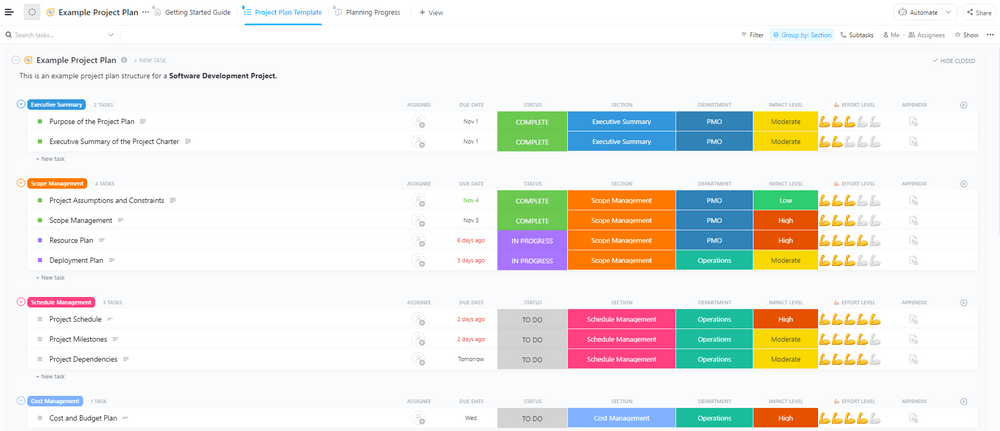
2. Utilize project management software and tools
Reliable real estate CRM software and other tools are necessary to execute everything in the plan. It doesn’t only make planning quick and easy, but it also makes collaboration and tracking progress a lot easier, provide everyone with a continuous workflow, and keeps budget and resources under control.
Your project manager needs the right software for creating visibility into project cost risks and to improve transparency across teams, stakeholders, and on.
PRO TIP
Learn how real estate agencies use ClickUp and use the Real Estate Project Management Template by ClickUp to effortlessly track contacts, properties, payments, notes, contracts, schedules, and so much more—all in one place.
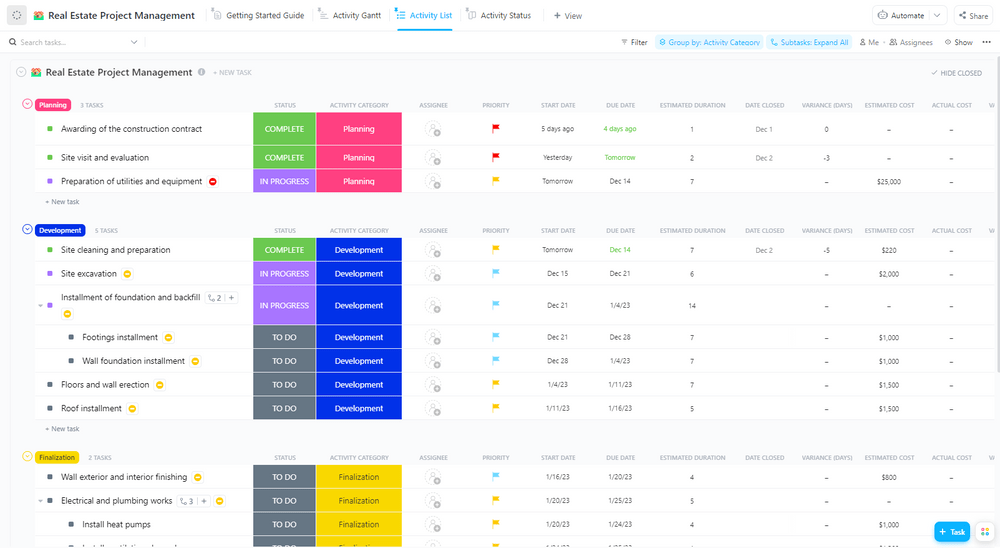
3. Ensure clear communication with stakeholders
It also requires communicating and collaborating with multiple people, such as clients, contractors, and other teams.
It’s highly important that there’s a clear line of communication between stakeholders, clients, and every member involved in the project. This keeps everyone efficient because there’s less confusion, immediate help is available, and it’s easy to collaborate.
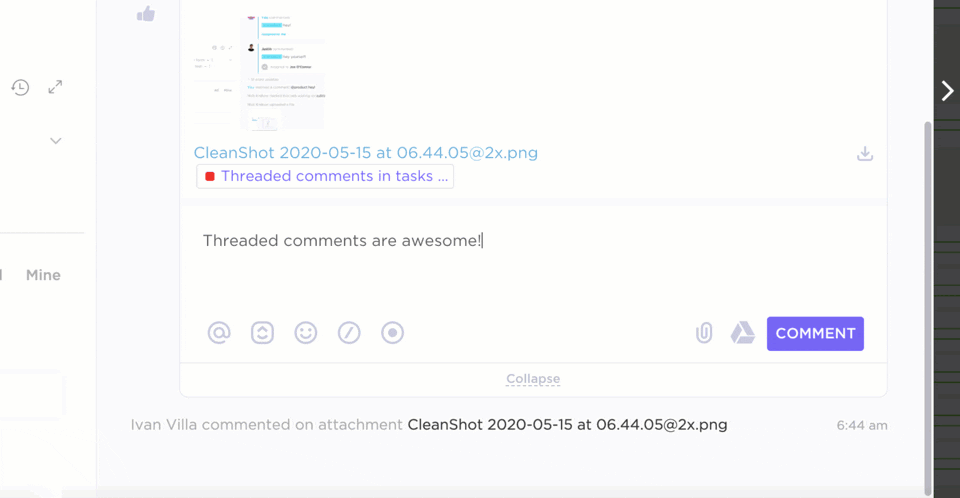
With that being said, there should be an established form of communication that works for everyone. Collaboration tools like ClickUp, with a built-in chat feature and other communication features, allow you to seamlessly work with others in real-time. Keep in mind, there are other types of communication that a project manager should be used in a real estate or construction project as well, such as:
- Interactive communication (in-person meetings, phone conversations, web conferencing)
- Push communication (emails, newsletters, documentation)
- Pull communication (project knowledge base, project management software)
PRO TIP
Streamline and simplify your client and stakeholder communication with the in-app email project management feature, Email in ClickUp. This useful feature brings all your communication in one place by allowing you to send and receive emails within ClickUp—saving you time from locating emails and toggling across multiple apps. Simply connect your email providers, such as Gmail, Outlook, and Office 365, to ClickUp and start organizing and fast-tracking your email communication.
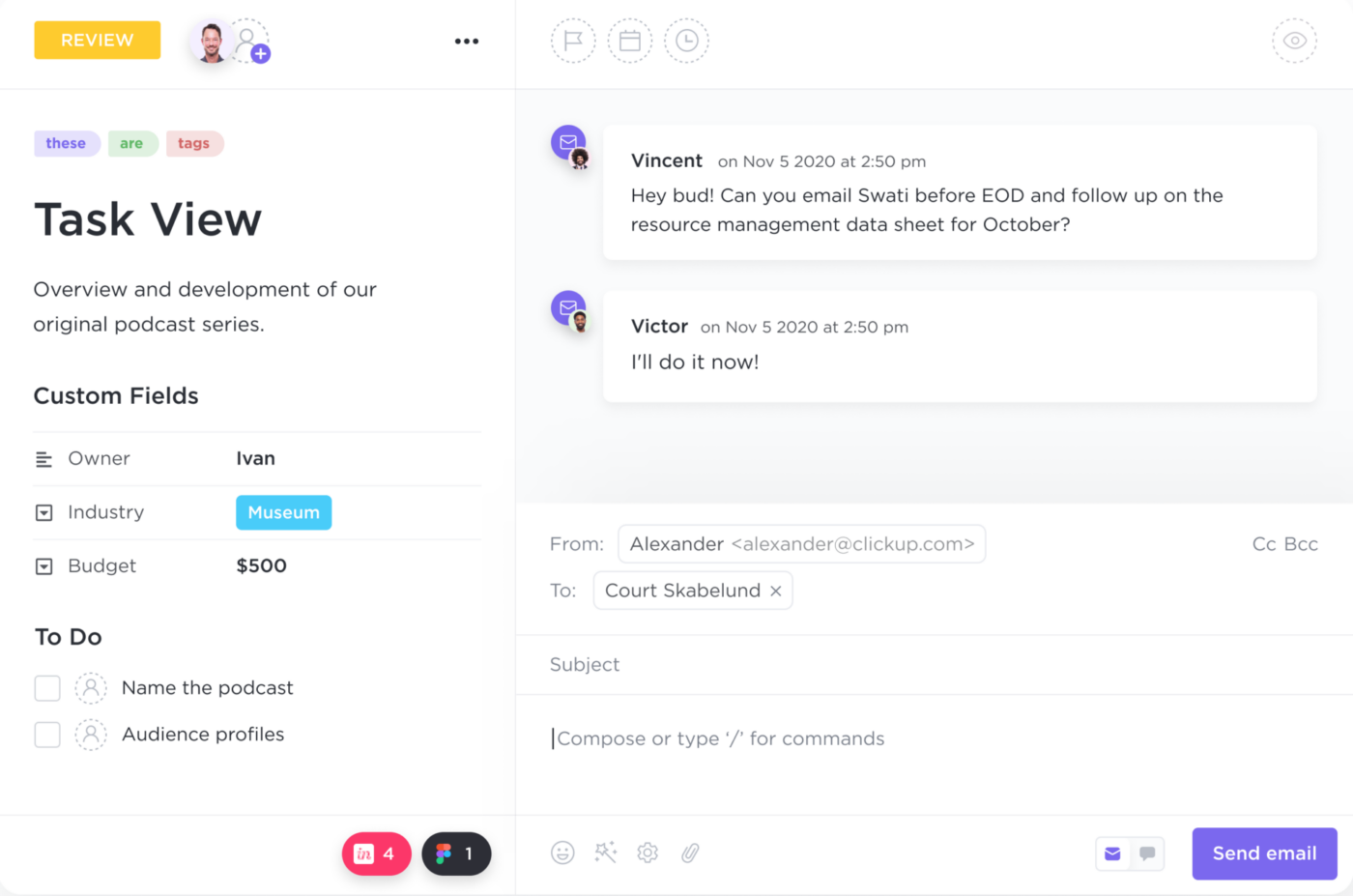
4. Emphasize risk management and contingency planning
Complex projects, especially in real estate or the construction industry, must focus on risk management and contingencies because the risk of losing investment is high. That being said, real estate managers need to collaborate with stakeholders to create a strategic plan everyone can focus on when the unfavorable happens. In this context, triggers should be determined, every type of potential risk should be identified, and different realistic scenarios should be simulated.
Stakeholders should always be informed about any setbacks, bottlenecks, changes, and other important details pertaining to the project. Aside from that, they may need to authorize movements too. This can include having knowledge or access to resources, plan support, or purchases.
Try out these contingency planning templates!
PRO TIP
Learn the criteria for risk management software and easily create a strategic plan with the help of the Strategic Plan Whiteboard Template by ClickUp. Utilize this visual roadmap to help your team coordinate key steps and capture all the necessary information.

5. Continuously monitor and evaluate project progress
You can’t possibly know if things are going according to plan when you’re not monitoring them, right? Tracking and evaluating the progress can help detect issues that can affect the scope, budget, and time early on—all the way to completion. These are the skills needed from real estate managers to prevent and implement appropriate solutions.
In addition, continuous monitoring and evaluation can help ensure the resources are efficiently used, eventually leading to better accountability and transparency.
PRO TIP
Keep track of important documents and resources, project progress, and more with customizable Dashboards in ClickUp. Choose from over 50 widgets and create a custom dashboard to help get a high-level overview of all your work and easily monitor project progress.
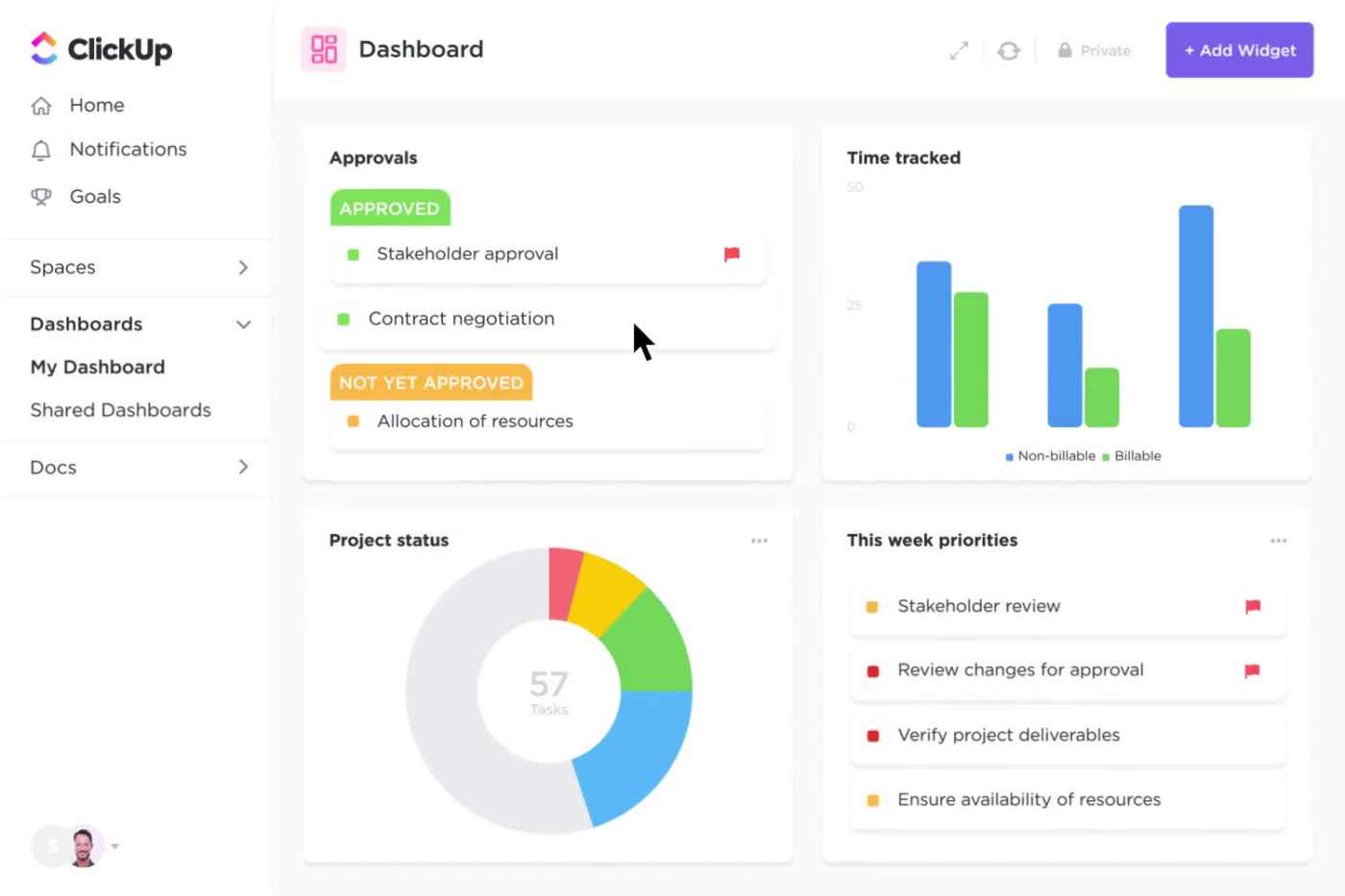
Benefits of Real Estate Project Management
When it comes to the real estate industry, project management is a major factor that can make or break an investment. If done correctly, you can reap a number of benefits that can help you in the long run. Here are a few benefits you can get from proper real estate project management:
- Improved project efficiency and effectiveness: Projects within the real estate industry can be heavily affected by inefficiencies, improperly defined project scope, and inefficient detailing of plans. However, with project management, you can easily optimize methodologies by breaking down the project into small, easy-to-do tasks
- Better risk management: Project managers can mitigate these risks through proper planning, securing insurance, overseeing contracts, and knowledge of regulations for construction
- Enhanced stakeholder communication and collaboration: With a project management tool, you can streamline communication to make task delegation easier and keep everyone updated, ultimately returning to the benefit of improved efficiency and effectiveness
Manage Real Estate Projects with Ease with ClickUp
Project management in the real estate industry calls for comprehensive planning that includes human resources, budget, timeline, contingencies, and communication plans.
It may seem like a daunting task, but with an all-in-one project management tool like ClickUp, you can do all these things in a more simplified way. ClickUp has hundreds of powerful features, including customizable templates for real estate management, that can make project management more flexible and controlled at all times.
Try it for free and use it to help you manage all your projects and client communication—all in one place.
Guest Writer:

David Bitton is the co-founder and CMO of DoorLoop, a best-selling author, legal CLE speaker, and real estate investor. He is a five-time entrepreneur who has been surrounded by real estate his entire life, with a background as an investor, realtor, and community manager. He is also a best-selling author and legal CLE speaker.







